john wilkes booth
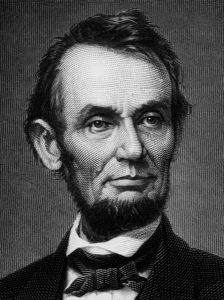
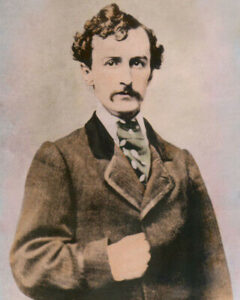 John Wilkes Booth was an actor, and as such, he had an expectation of applause following a performance. That is just what he thought the assassination of President Lincoln was. No, he didn’t think it was fake. He knew he was murdering the President of the United States, but he somehow thought people would consider it one of his greatest performances…the crowning moment of his stage career. It never occurred to him that the people who had loved him as an actor would suddenly turn against him.
John Wilkes Booth was an actor, and as such, he had an expectation of applause following a performance. That is just what he thought the assassination of President Lincoln was. No, he didn’t think it was fake. He knew he was murdering the President of the United States, but he somehow thought people would consider it one of his greatest performances…the crowning moment of his stage career. It never occurred to him that the people who had loved him as an actor would suddenly turn against him.
At the very least, he expected to be greeted with applause and support by those sympathetic to the Confederacy. Instead, he found, much to his shock and great dismay, that he was a hounded man, and few wanted to associate with him. Oh, the loyalists to the Confederacy did their duty by him, but with great reluctance. He first encountered this reaction when he and David Herold, who was an American pharmacist’s assistant and Wilkes accomplice in the assassination of Abraham Lincoln, stumbled upon a man in the dark, while searching for the home of Colonel Cox. The man, a local named Oswell Swann, reluctantly agreed to guide then to the Cox home, but only if he received payment for his services. He considered it just reward for the risk he was taking. Afterward, Swann collected his fee and vanished into the night, leaving the fugitives to the “hospitality” of Colonel Cox. That “hospitality” consisted of a few supplies, including whiskey, and a servant to lead the men to a hiding place in the woods. Cox certainly didn’t want these men to be found in his house.
Cox informed Booth that he was to “remain hidden in the woods until contacted.” Then Cox sent for Thomas Jones, a Confederate agent with experience in smuggling spies and information across the Potomac River into Virginia. Jones agreed to get them out and guide them across the Potomac, for a fee, but when he visited the fugitives in the woods, where they hid in a pine thicket, he told them it would be several days before he could do so. The manhunt for Booth and Herold was massive. Federal troops combed the area, searching properties and interrogating citizens over whether they had seen two men traveling together. Booth was very distressed, because instead of receiving the expected support and appreciation of the south, Booth found himself confined to a pine thicket!! Jones provided the men with newspapers, from which Booth discovered that he was widely considered a villainous murderer, rather than the Confederate hero he had expected to be. He wrote about his “horrible” fate, and the “injustice” of it all, in a diary he kept in an appointment book.
Federal authorities had most of the conspirators who had planned to kidnap Abraham Lincoln in custody by April 20, 1865. Several were not party to the assassination, but because they were involved in the kidnapping plans, they were held anyway. Three men were still not in custody…Booth, Herold, and John Surratt remained at large. The War Department put out wanted poster, released in Washington on April 20, offering a $50,000 reward for Booth, and $25,000 apiece for Herold and Surratt. By then, Surratt was hiding out in Canada, even though he knew that his mother was being held in federal custody. Coward that he was, Surratt was making plans to flee to Europe. Booth and Herold continued to cower in a pine thicket, relatively helpless. They didn’t dare leave, because they would be seen and immediately arrested. A dejected Booth spent his time drinking whiskey and scribbling in his makeshift diary over the unfairness of his reception. He believed his action had made him a martyr to the Confederate cause.
When the fugitives finally attempted to cross the Potomac, on about April 21, Jones’s guidance consisted of verbal instructions directing them to a waiting boat. These men had no boating experience, and the night was windy. The tides and swift current didn’t help matters either. Nor did the gunboats in the area. Booth whined into his diary, “last night being chased by gunboats till I was forced to return wet, cold, and starving.” Needless to say, the crossing was a failure, but Booth’s overly dramatic entry exaggerated what may have been an encounter with USS Juniper, positioned in the river near their point of crossing. Juniper’s log did not include a report of chasing anything that night. Booth likely spotted the gunboat, and in a panic, returned to the Maryland shore. Booth’s fugitive days ended when he was caught on April 26, 1865, near Port Royal, Virginia. As Booth and his co-conspirator, David Herold, cowered inside a barn, the soldiers demanded that they surrender. John Wilkes Booth died in agonizing fashion at the hands of Union soldiers in Port Royal, Virginia, 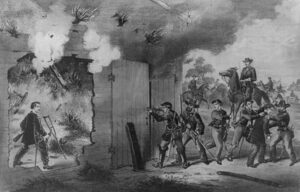
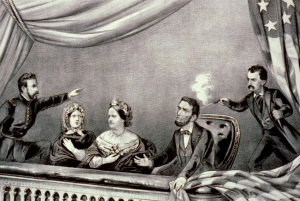 two weeks after he assassinated Abraham Lincoln. When the Union soldiers demanded their surrender, Herold complied. But Booth refused. He didn’t leave the barn until one of the soldiers set it on fire. As he tried to sneak out in the shadows and flame, a shot cracked through the silent night…and found its mark. Booth briefly held on to life, but in the end, the bullet would be his demise…in true disgraced style.
two weeks after he assassinated Abraham Lincoln. When the Union soldiers demanded their surrender, Herold complied. But Booth refused. He didn’t leave the barn until one of the soldiers set it on fire. As he tried to sneak out in the shadows and flame, a shot cracked through the silent night…and found its mark. Booth briefly held on to life, but in the end, the bullet would be his demise…in true disgraced style.

 People are free to call it whatever they want to, but I prefer to follow the Biblical version, in which Joseph was warned in a dream, to move his son, Jesus to Egypt, because the Pharaoh was looking for Him so he could kill Him. Joseph heeded the warning. and the family moved immediately…like in the middle of the night, while those who were a danger to him were sleeping. Thankfully Joseph heeded that dream. Just imagine our world if he had not.
People are free to call it whatever they want to, but I prefer to follow the Biblical version, in which Joseph was warned in a dream, to move his son, Jesus to Egypt, because the Pharaoh was looking for Him so he could kill Him. Joseph heeded the warning. and the family moved immediately…like in the middle of the night, while those who were a danger to him were sleeping. Thankfully Joseph heeded that dream. Just imagine our world if he had not.
There have been other people who have had dream warnings, or prophetic dreams, whether a warning or a great blessing that was coming their way. I believe that our dreams can be a matter of God talking to us. President Abraham Lincoln was one of those people who had a prophetic dream, and it has been well documented through the years, for those of us who have chosen to listen. President Lincoln had his dream on April 4, 1865, and the dream was so troubling that he actually told it to a number of people including his wife, Mary Todd Lincoln and his former law partner, Ward Hill Lamon on April 11, 1865.
According to Lamon’s recollection, President Abraham Lincoln dreams on this night in 1865 “of ‘the subdued sobs of mourners’ and a corpse lying on a catafalque in the White House East Room.” In the dream, Lincoln asked a soldier standing guard “Who is dead in the White House?” to which the soldier replied, “the President. He was killed by an assassin.” Lincoln woke up at that point. On April 11, he told Lamon that the dream had “strangely annoyed” him ever since. Ten days after having the dream, Lincoln was shot dead by an assassin while attending the theater. Abraham Lincoln was shot by John Wilkes Booth while attending a play at Ford’s Theater in Washington DC on April 14, 1865. His assassination was the only successful leg in a conspiracy that also intended on capturing or killing Vice President Andrew Johnson and Secretary of State William Seward.
Interestingly, Lincoln supposedly later insisted to Lamon that the body on display was not his own…so he, himself did not view the dream as a warning of his own death. Some historians have discounted Lamon’s account, which was first published in the 1880s, nearly 20 years after the assassination. Nevertheless, Lamon claimed to have reconstructed the incident based on notes he made in 1865. I suppose the historians believe that since neither he nor Mary Lincoln mentioned the dream right after the president’s murder, it must not have been true. I believe that it was true, and that they were in such shock, that it never occurred to them to bring it up. Still, it is well known that Lincoln was a dreamer and was apparently quite interested in the meaning of dreams and what they have to say about future events both positive and negative. Proof of his curiosity lies in an 1863 letter to his wife, who at the time was in Philadelphia with their 10-year-old son, Tad. Lincoln writes that Mary had better “put Tad’s pistol away” as he “had an ugly dream about him.” Moreover, members of Lincoln’s cabinet recalled that, on the morning of his assassination, the president told them he’d dreamed of sailing across an unknown body of water at great speed. He also apparently revealed that he’d had the same dream repeatedly on previous occasions, before “nearly every great and important event of the War.”
The Secret Service was formed as a result of that assassination, but just imagine if they had all heeded the dream warning and placed a better guard around President Lincoln. If those he told of the dream, had considered the possibility of missing the play, or posted guards around the president, how different could have been the outcome. The world will never know, because one of our greatest presidents was gone before he could finish his second term in office. Lincoln was a very popular president. In his run against Democrat, George B 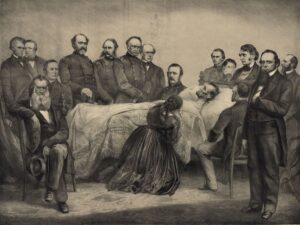
 McClellan, Lincoln carried all but three states (Kentucky, New Jersey, and Delaware), and won 55 percent of the vote. He won 212 electoral votes to McClellan’s 21, which goes to show that most of the people approved of his anti-slavery policies, as opposed to the Democrats, who wanted to keep slavery, and who fought against the slaves and minority races…and still do, even to this day.
McClellan, Lincoln carried all but three states (Kentucky, New Jersey, and Delaware), and won 55 percent of the vote. He won 212 electoral votes to McClellan’s 21, which goes to show that most of the people approved of his anti-slavery policies, as opposed to the Democrats, who wanted to keep slavery, and who fought against the slaves and minority races…and still do, even to this day.
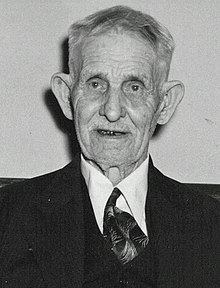
 Imagine being a witness to a part of history. Of course, we all are. We witness our part of history, because history happens all around us. It’s just that some events are more. More what you might ask. More devastating, more tragic, more exciting, just more. One such event was the assassination of President Lincoln. I can’t begin to imagine what it would have been like to go out for a night at the theater only to have the evening shattered be gunfire…and then to look up and see that your President was slumped over, bleeding, and dying. Now imagine you were just a child at the time.
Imagine being a witness to a part of history. Of course, we all are. We witness our part of history, because history happens all around us. It’s just that some events are more. More what you might ask. More devastating, more tragic, more exciting, just more. One such event was the assassination of President Lincoln. I can’t begin to imagine what it would have been like to go out for a night at the theater only to have the evening shattered be gunfire…and then to look up and see that your President was slumped over, bleeding, and dying. Now imagine you were just a child at the time.
That was the situation Samuel Seymour found himself in on April 14, 1865. On April 14, 1865, Seymour was five years old, when his godmother, who was the wife of his father’s employer took him to see Our American Cousin at Ford’s Theater in Washington DC. They were sitting in the balcony across the theater from the Presidential box. Everyone knew President Lincoln. I don’t know how star struck people got back then. Not nearly as much as today, but everyone knew him. A while later, says Seymour, “All of a sudden a shot rang out…and someone in the President’s box screamed. I saw Lincoln slumped forward in his seat.” Suddenly, John Wilkes Booth jumped from the box to the stage. What five year old boy wouldn’t remember those two events. Of course, Seymour didn’t understand what had happened to President Lincoln,  but he was very concerned for Booth, who broke his leg in the jump. He was just a child.
but he was very concerned for Booth, who broke his leg in the jump. He was just a child.
As a child, Seymour was the youngest person in the theater. Most, if not all of the people there were adults. Two months before his death, Seymour appeared on the February 9, 1956, broadcast of the CBS TV panel show “I’ve Got a Secret.” Seymour was hurt in a fall prior to the show, and the show’s producers had urged Seymour to postpone his appearance on the show. Seymour’s doctor left the choice up to Seymour, Seymour chose to go on. During the panelists correctly guessed that Seymour witnessed the assassination of Lincoln. Seymour died on April 12, 1956, and with that, the last witness to Lincoln’s assassination was gone.
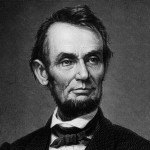 Imagine a world without income taxes. I’m sure a lot of us would love to do just that. I don’t know what the taxes are called in other nations, but suffice it to say that the name doesn’t mean a thing…it’s still a tax, and it still has to be paid. In the United States…for many years, there was no income tax, at least not until August 5, 1861, when President Lincoln imposes the first federal income tax to help pay for the Civil War costs. The tax started when President Lincoln and Congress agreed to impose a tax of 3% on annual incomes over $800.00. I’m sure that the people were as unhappy about that as we would be today about gun control. The whole thing seemed unfair and for many unconstitutional.
Imagine a world without income taxes. I’m sure a lot of us would love to do just that. I don’t know what the taxes are called in other nations, but suffice it to say that the name doesn’t mean a thing…it’s still a tax, and it still has to be paid. In the United States…for many years, there was no income tax, at least not until August 5, 1861, when President Lincoln imposes the first federal income tax to help pay for the Civil War costs. The tax started when President Lincoln and Congress agreed to impose a tax of 3% on annual incomes over $800.00. I’m sure that the people were as unhappy about that as we would be today about gun control. The whole thing seemed unfair and for many unconstitutional.
The constitutionality of a federal income tax, was something President Lincoln checked into thoroughly, and I’m sure that it was the last thing he wanted to do, because that kind of thing can be 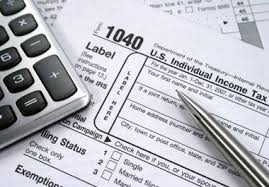 political suicide, and in this case…I have to wonder if it played a part in Lincoln’s assassination, although it was said that John Wilkes Booth killed him because he disagreed with his stance on slavery.
political suicide, and in this case…I have to wonder if it played a part in Lincoln’s assassination, although it was said that John Wilkes Booth killed him because he disagreed with his stance on slavery.
Sometime, around March of 1861, Lincoln began to look at the government’s ability to wage a war against the South, and found that it was lacking. He sent letters to cabinet members Edward Bates, Gideon Welles, and Salmon Chase. Lincoln wanted to get their opinions as to whether or not the president had the constitutional authority to “collect [such] duties.” According to the documents, and their interpretations, which are now housed in the Library of Congress…Lincoln was very concerned about maintaining federal authority over collecting revenue from ports along the southeastern seaboard…as they might fall under the control of the Confederacy.
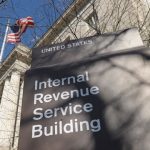
The Revenue Act was broadly written to define income as gain “derived from any kind of property, or from any professional trade, employment, or vocation carried on in the United States or elsewhere or from any source whatever.” The comparable minimum tax as of 2003 would have put the minimum taxable income at about $16,000. The Income Tax went into effect, and the Civil War was funded. Then in 1871, Congress repealed Lincoln’s tax law, but in 1909, they passed the 16th Amendment, which made Income Tax a permanent tax, and the one we use today. The 16th Amendment was ratified in 1913. Sometimes, I wish they hadn’t done that, but I suppose it is necessary, though maybe not always fair.

